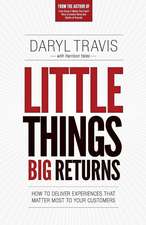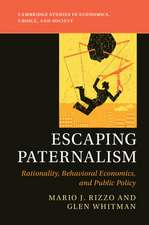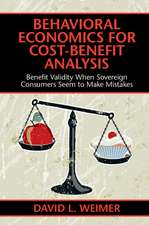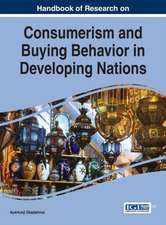The Economics of Violence: How Behavioral Science Can Transform our View of Crime, Insurgency, and Terrorism
Autor Gary M. Shiffmanen Limba Engleză Paperback – 29 ian 2020
| Toate formatele și edițiile | Preț | Express |
|---|---|---|
| Paperback (1) | 192.87 lei 43-57 zile | |
| Cambridge University Press – 29 ian 2020 | 192.87 lei 43-57 zile | |
| Hardback (1) | 696.96 lei 43-57 zile | |
| Cambridge University Press – 29 ian 2020 | 696.96 lei 43-57 zile |
Preț: 192.87 lei
Nou
Puncte Express: 289
Preț estimativ în valută:
36.90€ • 38.64$ • 30.54£
36.90€ • 38.64$ • 30.54£
Carte tipărită la comandă
Livrare economică 07-21 aprilie
Preluare comenzi: 021 569.72.76
Specificații
ISBN-13: 9781107465756
ISBN-10: 1107465753
Pagini: 240
Ilustrații: 2 b/w illus. 1 map
Dimensiuni: 153 x 228 x 13 mm
Greutate: 0.41 kg
Editura: Cambridge University Press
Colecția Cambridge University Press
Locul publicării:New York, United States
ISBN-10: 1107465753
Pagini: 240
Ilustrații: 2 b/w illus. 1 map
Dimensiuni: 153 x 228 x 13 mm
Greutate: 0.41 kg
Editura: Cambridge University Press
Colecția Cambridge University Press
Locul publicării:New York, United States
Cuprins
Introduction; 1. Violence; 2. The human condition; 3. Organized crime; 4. Insurgency; 5. Terrorism; 6. The rise of the Islamic State in al Qaeda's market; 7. Conclusions and prescriptions.
Recenzii
'As advances in behavioral science reveal the complex but animating dynamics of human behavior, all those forces that make us fear, or fight, or give us courage, or move us to some action, nefarious states and organizations are learning how to manipulate people and become drivers of violence. In his illuminating new book, national security veteran Gary M. Shiffman takes us to the edge of understanding the nexus between behavior and organized violence. This is a must read not only for leaders in the defense and security sector, but all leaders who want to better understand the opportunities and the dangers of manipulating human action.' Steve Clemons, Editor at Large, The Hill
'Conventional wisdom often views sub-state violence as an irrational expression of religious, tribal, or ethnic identity. In his must-read book, Gary M. Shiffman offers a powerful counter, demonstrating that understanding organized violence requires analyzing individual decision-making – and the available incentives and choices. Shiffman combines his own rich experience with deep economic analysis and case studies that range from Pablo Escobar to Abu Bakr al-Baghdadi, and, in so doing, has written a definitive volume on the insights behavioral science offers to national security policymakers.' Richard Fontaine, CEO, Center for a New American Security (CNAS)
'Readable and ambitious, The Economics of Violence uses colorful examples to sketch a common approach to studying organized crime, insurgency, and terrorism. Professor Shiffman then draws on his own experience to explain how those insights can inform combatting all three. Highly recommended for practitioners, scholars, and anyone interested in new thinking on how these threats can be contained.' Eli Berman, co-author of Small Wars, Big Data: The Information Revolution in Modern Conflict
'The Economics of Violence is a pathbreaking work that argues how a more rigorous understanding of human behavior can be harnessed to counter violence more effectively. Drawing on his formidable intellect and experiences in the military, as a Senate staffer, a homeland security executive, an entrepreneur, and a security studies scholar, Shiffman makes a powerful case for this unique approach to strengthening US national security.' Bruce Hoffman, Georgetown University, Washington DC, and author of Inside Terrorism
'Gary M. Shiffman's new book, The Economics of Violence, is unique, provocative, and important.' Senator Joe Lieberman
'Understanding political violence requires turning away from simplistic labels – 'ethno-nationalist', 'narco-terrorist', 'religious radical' – toward the scientifically grounded concepts of scarcity, markets, and firms. Shiffman's enlightening and accessible prose demystifies today's national security threats with precise logic, careful case studies, and wide-ranging pop-culture references. A brilliant ground-breaking book that every national security professional should read.' Jacob Shapiro, Princeton University, New Jersey
'Gary M. Shiffman uses the science of economics as a tool for understanding violent human behavior, and he shows us how better to understand those who would harm us. Gary brings provocative, innovative, and exciting ideas to those seeking knowledge, clarity, and peace of mind in the promotion of freedom and security. The Economics of Violence is an exciting new book from an established and important voice in national security.' Senator Connie Mack, III
'This is a valuable book that should set records straight about stereotypes, identity, politics, and misleading assumptions. I have been disabused of some of my assumptions, and the reader will find the recipe for combatting violent groups in the last chapter.' HRH Prince Turki Al Faisal Al Sa'ud, former Director General of the General Intelligence Directorate of the Kingdom of Saudi Arabia
'Gary M. Shiffman has always been a clarion voice in understanding the importance of behavioral science and economics in national security - never more so than in this work. In this book, Shiffman has provided a seminal study of how economic dynamics and individual decisions affect the manifestations of violence and the evolution of terrorist, militant, and criminal movements in a changing global landscape. By using an economic lens, he breaks down the orthodoxy between traditional disciplines and rigid categories of identity to understand sources of violence and how non-state actors emerge, adapt, and compete. By examining the cases of Pablo Escobar, Joseph Kony, and Osama bin Laden in this way, he is able to explain how each have acted as 'entrepreneurs' using force and forms of coercion to capture markets, each in his own way. This should become required reading for those seeking to understand how individual decisions drive sub-state groups and violence, and how we might use these insights to counter this violence and fight like entrepreneurs.' Juan C. Zarate, former Deputy Assistant to the President and Deputy National Security Advisor for Combatting Terrorism (2005–9)
'The Economics of Violence: How Behavioral Science Can Transform our View of Crime, Insurgency, and Terrorism is a model of meticulous scholarship that is expertly organized and effectively presented. An impressively informative contribution to our on-going national dialogue, especially given the dramatic impact that the pandemic is having on both the American and the Global economies … It should be noted for the personal reading lists of students, academia, governmental policy makers, and non- specialist general readers with an interest in the subject that …' James A. Cox, Midwest Book Review
'Conventional wisdom often views sub-state violence as an irrational expression of religious, tribal, or ethnic identity. In his must-read book, Gary M. Shiffman offers a powerful counter, demonstrating that understanding organized violence requires analyzing individual decision-making – and the available incentives and choices. Shiffman combines his own rich experience with deep economic analysis and case studies that range from Pablo Escobar to Abu Bakr al-Baghdadi, and, in so doing, has written a definitive volume on the insights behavioral science offers to national security policymakers.' Richard Fontaine, CEO, Center for a New American Security (CNAS)
'Readable and ambitious, The Economics of Violence uses colorful examples to sketch a common approach to studying organized crime, insurgency, and terrorism. Professor Shiffman then draws on his own experience to explain how those insights can inform combatting all three. Highly recommended for practitioners, scholars, and anyone interested in new thinking on how these threats can be contained.' Eli Berman, co-author of Small Wars, Big Data: The Information Revolution in Modern Conflict
'The Economics of Violence is a pathbreaking work that argues how a more rigorous understanding of human behavior can be harnessed to counter violence more effectively. Drawing on his formidable intellect and experiences in the military, as a Senate staffer, a homeland security executive, an entrepreneur, and a security studies scholar, Shiffman makes a powerful case for this unique approach to strengthening US national security.' Bruce Hoffman, Georgetown University, Washington DC, and author of Inside Terrorism
'Gary M. Shiffman's new book, The Economics of Violence, is unique, provocative, and important.' Senator Joe Lieberman
'Understanding political violence requires turning away from simplistic labels – 'ethno-nationalist', 'narco-terrorist', 'religious radical' – toward the scientifically grounded concepts of scarcity, markets, and firms. Shiffman's enlightening and accessible prose demystifies today's national security threats with precise logic, careful case studies, and wide-ranging pop-culture references. A brilliant ground-breaking book that every national security professional should read.' Jacob Shapiro, Princeton University, New Jersey
'Gary M. Shiffman uses the science of economics as a tool for understanding violent human behavior, and he shows us how better to understand those who would harm us. Gary brings provocative, innovative, and exciting ideas to those seeking knowledge, clarity, and peace of mind in the promotion of freedom and security. The Economics of Violence is an exciting new book from an established and important voice in national security.' Senator Connie Mack, III
'This is a valuable book that should set records straight about stereotypes, identity, politics, and misleading assumptions. I have been disabused of some of my assumptions, and the reader will find the recipe for combatting violent groups in the last chapter.' HRH Prince Turki Al Faisal Al Sa'ud, former Director General of the General Intelligence Directorate of the Kingdom of Saudi Arabia
'Gary M. Shiffman has always been a clarion voice in understanding the importance of behavioral science and economics in national security - never more so than in this work. In this book, Shiffman has provided a seminal study of how economic dynamics and individual decisions affect the manifestations of violence and the evolution of terrorist, militant, and criminal movements in a changing global landscape. By using an economic lens, he breaks down the orthodoxy between traditional disciplines and rigid categories of identity to understand sources of violence and how non-state actors emerge, adapt, and compete. By examining the cases of Pablo Escobar, Joseph Kony, and Osama bin Laden in this way, he is able to explain how each have acted as 'entrepreneurs' using force and forms of coercion to capture markets, each in his own way. This should become required reading for those seeking to understand how individual decisions drive sub-state groups and violence, and how we might use these insights to counter this violence and fight like entrepreneurs.' Juan C. Zarate, former Deputy Assistant to the President and Deputy National Security Advisor for Combatting Terrorism (2005–9)
'The Economics of Violence: How Behavioral Science Can Transform our View of Crime, Insurgency, and Terrorism is a model of meticulous scholarship that is expertly organized and effectively presented. An impressively informative contribution to our on-going national dialogue, especially given the dramatic impact that the pandemic is having on both the American and the Global economies … It should be noted for the personal reading lists of students, academia, governmental policy makers, and non- specialist general readers with an interest in the subject that …' James A. Cox, Midwest Book Review
Notă biografică
Descriere
Using behavioral economics, we can change how we perceive the threats to our safety and security faced today and better inform the institutions of our future.
























